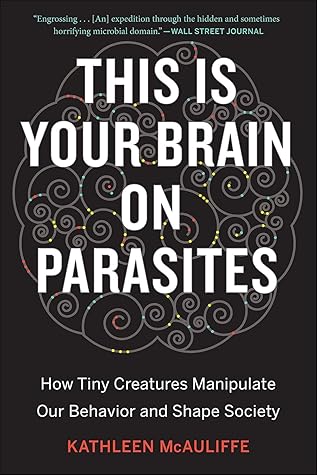More on this book
Community
Kindle Notes & Highlights
Read between
March 17 - July 9, 2019
Numerous lines of evidence suggest that the prevalence of parasites in our broader communities influences the foods we eat, our religious practices, whom we choose as mates, and the governments that rule us.
this subterranean realm appears to have gone uncharted simply because no one thought to look for it.
instinctual responses that protect against infection would also be amplified and embellished through learning and cultural transmission, further leveraging their benefit.
one should not assume animals are always acting of their own volition.
Ideas that challenge the status quo tend to be resisted,
Science is inherently reductive; its ethos is to break big problems down into smaller chunks that can be more easily attacked.
the dengue virus alters genes known to affect the functioning of the smell sensors in a mosquito’s antennae.
We think of vaccines as a sophisticated tool of modern medicine, but animals and humans without MDs have also figured out ways to vaccinate. When an ant gets a deadly fungus, for example, another member of its colony will rush up and lick it, thereby exposing the insect to a tiny dose of the disease agent. This method of inoculation is not without perils—2 percent of ants perish.
“It takes all the running you can do, to keep in the same place.”)
observation, insufficient sleep immediately before or after receiving a vaccine reduces the body’s immune response by half, greatly diminishing the protective benefits of inoculation—something to keep in mind when you’re due for your next flu shot.
Whatever originally prompted early humans to ingest spices, numerous factors would have favored their incorporation into everyday diets. As Sherman and Billing pointed out, the custom not only cut down on food-borne illness but also allowed people to preserve food longer—a huge advantage in times of scarcity.
“Which is more shocking, to talk about shit, or the fact that kids are dying because we don’t talk about shit?”
one possible reason that mood disorders are so common today is that our worrywart ancestors were good at dodging parasites—and they passed their anxious dispositions down to us.
Even if we could banish the world of infectious disease, said Schaller, it wouldn’t eradicate prejudice.
opposition to immigration increased in direct proportion to disgust sensitivity.
greatest opposition to immigration where contagious disease was most prevalent and, predictably, where worry about infection was highest.
In Pittsburgh in the 1930s, African Americans were dragged out of a public pool and ordered to stay away unless they could proffer health certificates showing that they were free of disease.
“I consider it an intellectual achievement that I became liberalized about a lot of issues.”
A fear of germs does more than slant people’s religious and political views. It literally leads them to think of morality in black-and-white terms—a finding with disturbing ramifications for the criminal justice system.
Consider the fate that awaited some of the first people to get syphilis: Pustules popped up on their skin from their heads to their knees, then their flesh began to fall off their bodies, and within three months they were dead.
The Torah contains much more medical wisdom—and by that I don’t mean merely its famous admonishments to avoid eating pork (a source of trichinosis, a parasitic disease caused by a roundworm) and shellfish (filter feeders that concentrate contaminants) and to circumcise sons (bacteria can collect under the foreskin flap, so removing it is believed to have lowered the spread of STDs).
Jews were instructed to bathe on the Sabbath (every Saturday); cover their wells (a good idea, as it kept out vermin and insects); engage in cleansing rituals if exposed to bodily fluids like blood, feces, pus, and semen; quarantine people with leprosy and other skin diseases and, if infection persisted in the community, burn their clothes; bury the dead quickly before corpses decomposed; submerge dishes and eating utensils in boiling water after use; never consume the flesh of an animal that had died of natural causes (a sign that it might have been felled by illness) or eat meat more than
...more
an intact corpse tends to go over better with juries than one smeared with blood and chopped into pieces.
Countries under severe parasite stress were more likely to be controlled by dictators; gender inequality was pronounced, and wealth tended to be concentrated in the hands of a small class of elites. In contrast, countries with the least amount of infectious disease had wealth more equitably distributed; their women were on a more equal footing with men, and individual rights were far more extensive. They were overwhelmingly democracies.
If there’s one thing we know in cognitive behavioral sciences, it’s this: Everything is multi-determined.”
What we call the universe is nothing more than a bubble of flatulence in its monstrous, gurgling gut, and we can no more comprehend its complexity and purpose than E. coli could imagine what makes a human tick or fathom the vast expanse of time that separates its lifespan from our own.


